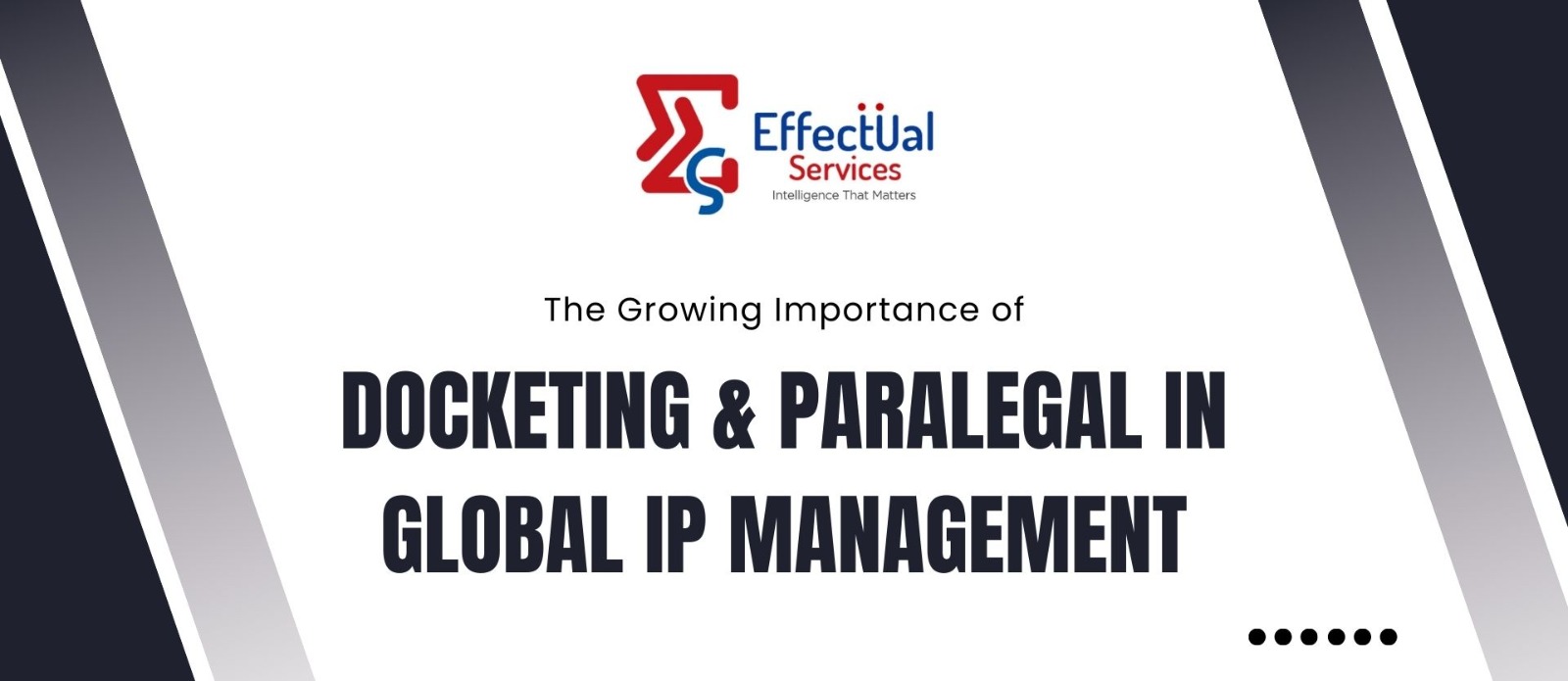The Growing Importance of Docketing & Paralegal in Global IP Management

The phrase "The Growing Importance of Docketing & Paralegal in Global IP Management" signifies a transformative shift in the way intellectual property (IP) is managed and protected worldwide. As we know about the global economy day by day increasingly relies on intangible assets, such as Patents, Trademarks, and Copyrights and the support systems behind these assets, particularly docketing and paralegal services, have become more essential to their effective administration. As organizations continue to expand their IP portfolios across international borders, the administrative and procedural complexities have grown significantly, making efficient docketing and well-trained paralegal support more important than ever.
In recent time driven global economy, Intellectual Property has become a more essential asset for business to secure non obviousness. Though in the form of Patents, Trademarks, Copyrights, or Trade secrets, Intellectual Property has not only protected innovations but also enhance business growth, provides competitive advantages, and enhances company valuation in various ways in their portfolios.
The Complexity of Global IP Management - A Strategic Functions
Global IP Management provides to the structured and strategic oversight of intellectual property (IP) rights such as Patents, Trademarks, Copyrights, and Trade secrets across so many countries and regions. It encompasses a full lifecycle of activities including the filing of new applications, prosecution and examination of pending cases, ongoing maintenance and renewals, a part from that licensing arrangements and enforcement actions in the case of infringement or disputes. Managing IP on a global level is not simply about legal ownership but it’s about ensuring that every rights are properly protected, covered, utilized, and defended within the relevant jurisdiction.
As growing and expanding businesses of their operations into international markets, their innovations, non-obvious, ideas and brands must be safeguarded in each region where they operate or plan to enter in this industry. This leads to an expansion of their Intellectual Property portfolios, sometimes involving so many of distinct rights. These assets must be handled in accordance with each country’s unique environment law and posing a significant operational challenges. Unlike so many domestic Intellectual Property management, global oversight merges navigating different legal systems, regulatory bodies, languages, procedural norms, and timeline expectations. Each and every jurisdiction may have their own set of requirements for filing, examination procedures, deadlines for responses, and enforcement options, making coordination both work intensive and high-risk.
In many of multinational corporations, managing IP effectively at this scale means maintaining accurate, up-to-date records for each and every asset. This includes tracking deadlines for application filings, annuity payments, office action responses, oppositions from third parties, and license renewals. The complexity and volume involved in this industry, even a single missed deadline can result in substantial consequences, such as the loss of exclusive rights, legal liability, or damage to the company's market position and cost will be huge. The financial and reputational stakes are very high, especially in industries like pharmaceuticals, technology, or consumer goods where Intellectual Property shows a significant share of a company’s valuation.
Intellectual Property docketing and paralegal services have emerged as strategic functions, not merely administrative ones. Docketing professionals are responsible for tracking and updating critical legal deadlines using specialized IP management systems. Though, paralegals support the legal process by preparing documents, coordinating with international counsel, managing communication with patent and trademark offices, and ensuring procedural compliance. Maintaining Operational control over complex global portfolios, preventing errors, and staying ahead of critical legal events are the few roles of legal teams.
Intellectual Property docketing and paralegal support are not just about ‘keeping track’ of dates and paperwork. They are about protecting innovation, ensuring compliance, mitigating risk, and enabling businesses to act with confidence in the global marketplace. In today’s competitive and fast-moving environment, these functions play an essential role in ensuring that a company’s intellectual property remains a reliable and powerful strategic asset in the upcoming time. Each and every jurisdiction may have their own set of requirements for filing, examination procedures, deadlines for responses, and enforcement options, making coordination both work intensive.
What is Intellectual Property Docketing?
Docketing refers to the process of systematically recording and tracking critical deadlines and actions associated in the Intellectual Property assets. A docketing system helps and ensure that nothing falls through the cracks, whether it's a filing deadline in Europe, a response to a USPTO office action, or a trademark renewal in Japan.
The process of recording and tracking the various deadlines, events, and procedural requirements associated with Intellectual Property filings is known as Docketing. In a global view, this includes: Patent and trademark application deadlines, office action response windows, maintenance fee schedules, renewal dates and opposition periods.
Unnecessary legal risks or abandonment of valuable intellectual property rights may be an outcome if any of these critical deadlines are missed. Hence, in the high-stakes world of IP management, accurate and proactive docketing becomes an essential safeguard.
As portfolios grow into the millions and billions of assets spanning dozens of countries, a well-organized docketing system becomes not just helpful but mission-critical.
With the advent of specialized docketing software and Intellectual Property management tools, this function has become more automated yet simultaneously more sophisticated. However, the quality of docketing still depends heavily on the accuracy, attention to detail, and expertise of trained professionals.
Paralegals in Intellectual Property were viewed as administrative staff who handled paperwork. However, in today’s global Intellectual Property environment, they play a far more dynamic and strategic role. Intellectual Property paralegals often: Prepare and review filing documents, coordinate with foreign associates, conduct prior art or trademark clearance searches, manage communications with international patent and trademark offices and support Intellectual Property audits, portfolio reviews, and due diligence efforts
They serve as the operational backbone of Intellectual Property departments, ensuring that legal strategies translate into timely, accurate actions.
Traditionally seen as administrative support, the role of paralegals in Intellectual Property management has evolved significantly. Modern Intellectual Property paralegals are often involved in the preparing and filing patent and trademark applications, conducting prior art and trademark searches, managing global prosecution timelines, drafting and reviewing legal documents and liaising with foreign associates and law firms
Supporting litigation and enforcement efforts;
Their legal knowledge, coupled with procedural expertise, makes them invaluable to in-house legal teams and law firms alike. Particularly in global Intellectual Property management, paralegals serve as the linchpin between different stakeholders are like bridging legal, technical, and administrative workflows.
Technology and the Future of Intellectual Property Operations
The digital transformation of Intellectual Property management has given even more emphasis on the integration of docketing and paralegal functions. Artificial intelligence (AI) and data analytics are mostly used to predict their filing strategies, assess risk, and streamline workflows. Although, while technology can enhance efficiency, human oversight remains indispensable for contextual judgment, legal interpretation, and compliance monitoring.
Remote work and cloud generated collaboration have also recreated how docketing and paralegal teams operate, solving it easier to manage global portfolios in real timeline. Organizations now aim their Intellectual Property support professionals to not only be technology savvy but also adaptable and globally aware of this industry.
Why Intellectual Property Matters? Strategically and Financially Implications
Effective Intellectual Property docketing and paralegal services directly affect the success of Intellectual Property strategy. They reduce the risk of errors, increase speed to market, and ensure legal compliance and thereby protecting the value of Intellectual Property assets. For more start-ups and multinational corporations alike, this translates to stronger patent protection, better licensing opportunities, and enhanced investor confidence.
In industries like pharmaceuticals, technology, and manufacturing, where Intellectual Property can represent a significant portion of a company’s value the cost of poor docketing or inadequate paralegal support can be catastrophic.
Why the "Growing" Importance?
The importance of docketing and paralegal support is growing due to several converging trends:
- Globalization: More companies are filing IP internationally, increasing the complexity of management.
- Technology-Driven Innovation: Start-ups and tech firms depend heavily on IP as a core business asset, elevating the stakes.
- Legal and Regulatory Complexity: Each jurisdiction has its own IP laws, timelines, and formalities making global coordination essential.
- Cost and Risk Management: Mistakes in IP management can lead to lost rights or litigation, which are costly and damaging to reputation.
- Automation and Digitalization: New technologies require skilled professionals who can use docketing software and IP management platforms efficiently.
Together, these factors mean that organizations cannot afford to underinvest in their IP support infrastructure.
Strategic Value to Organizations
When done right, docketing and paralegal functions help:
- Protect IP rights effectively across jurisdictions
- Reduce legal risks and avoid costly errors
- Increase efficiency and reduce workload on attorneys
- Support better strategic decisions through reliable data
- Improve compliance and audit readiness
Conclusion
As intellectual property continues to drive innovation, competitiveness, and corporate value in the global economy, the roles of docketing and paralegal professionals have become more vital than ever. No longer limited to administrative support, these functions now serve as the backbone of efficient, compliant, and strategic IP operations. In a landscape defined by legal complexity, jurisdictional diversity, and increasing volumes of IP assets, skilled docketing and paralegal teams ensure that critical deadlines are met, risks are minimized, and rights are fully protected.
Investing in robust IP support systems and well-trained personnel is not just a matter of operational efficiency, it is a strategic imperative. Organizations that recognize and elevate the importance of these roles are better positioned to manage their global IP portfolios proactively, avoid costly oversights, and unlock the full value of their intellectual property in a fast-paced, innovation-driven world.
As intellectual property becomes central to global innovation and economic power, the disciplines of IP docketing and paralegal support have assumed a critical role. Far from being back-office functions, they now stand at the forefront of strategic IP management. Investing in well-trained professionals and robust systems is no longer optional it's essential for any organization seeking to navigate the complexitiaes of the global IP landscape with precision, compliance, and confidence.
To say there is "growing importance" in docketing and paralegal work is to recognize that these roles are no longer secondary, they are central to the integrity and success of global IP management. Organizations that prioritize building strong docketing systems and investing in capable IP paralegals are positioning themselves to protect innovation, enhance legal compliance, and compete effectively on a global stage.
About Effectual Services
Effectual Services is an award-winning Intellectual Property (IP) management advisory & consulting firm offering IP intelligence to Fortune 500 companies, law firms, research institutes and universities, and venture capital firms/PE firms, globally. Through research & intelligence we help our clients in taking critical business decisions backed with credible data sources, which in turn helps them achieve their organisational goals, foster innovation and achieve milestones within timelines while optimising costs.
We are one of the largest IP & business intelligence providers, globally serving clients for over a decade now. Our multidisciplinary teams of subject matter experts have deep knowledge of best practices across industries, are adept with benchmarking quality standards and use a combination of human and machine intellect to deliver quality projects. Having a global footprint in over 5 countries helps us to bridge boundaries and work seamlessly across multiple time zones, thus living to the core of our philosophy - Innovation is global, so are we !!!
Solutions Driving Innovation & Intelligence
Enabling Fortune 500's, R&D Giants, Law firms, Universities, Research institutes & SME's Around The Globe Gather Intelligence That
Protects and Nurtures Innovation Through a Team of 250+ Techno Legal Professionals.


